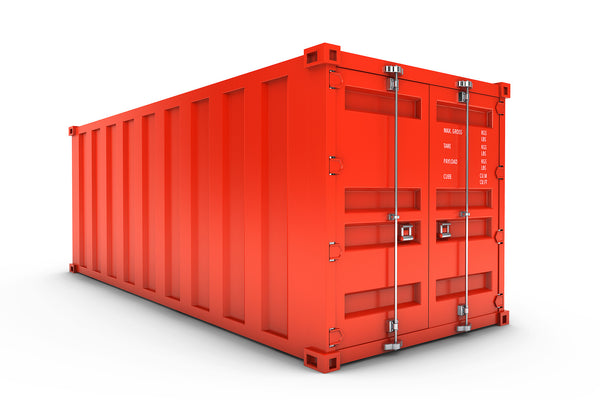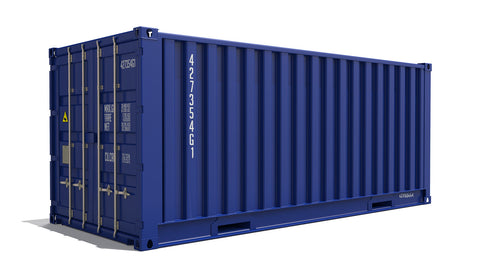How to maximize Shipping Containers for Sale for supply chain success
Everything You Required to Find Out About Shipping Containers and Their Practical Applications
Shipping containers have actually advanced from plain tools for transport to flexible frameworks with numerous functional applications. Their robust layout and basic sizing make them ideal for a range of usages beyond shipping. From innovative housing services to sustainable farming, their flexibility is significant. Yet, the possibilities do not finish there. Discovering their different functions exposes shocking insights right into modern-day obstacles and creative remedies. What various other duties could these containers play in today's globe?
The Design and Framework of Shipping Containers

Internally, containers are developed to make best use of area, commonly featuring wood or steel flooring that can support significant weight. Air flow systems may be included to prevent dampness build-up, which is important for sensitive cargo. Additionally, strengthened corners enable easy handling by cranes and forklifts, promoting smooth loading and unloading. This thoughtful layout and structure add to the containers' adaptability throughout different shipping and storage space applications.
Benefits of Using Shipping Containers
While many transport techniques have their benefits, the usage of delivery containers attracts attention as a result of their unmatched versatility and effectiveness. Shipping containers supply a standardized dimension, making them easy to pile and transfer across various settings of transport, including ships, trucks, and trains. This standardization reduces filling and unloading times, consequently raising total efficiency.
Shipping containers are created from durable products, providing durable defense for products during transportation. They are weather-resistant and secure, reducing the risk of damage from environmental elements or theft. In addition, the modular style of shipping containers enables very easy personalization, making it possible for businesses to adjust them for numerous functions, such as storage or mobile offices.
Ultimately, their transportability and cost-effectiveness make shipping containers an attractive choice for companies wanting to improve logistics and supply chain operations. These benefits contribute to the growing appeal of delivery containers in numerous industries.
Creative Real Estate Solutions With Shipping Containers
Ingenious real estate options have actually arised as an amazing application of shipping containers, leveraging their integral strengths for household use. These functional structures use a lasting choice to typical structure materials, frequently at a fraction of the price. Developers and architects have changed containers right into elegant, functional homes, dealing with diverse way of lives and preferences.

Shipping containers are ecologically pleasant, promoting recycling and reducing waste. Lots of projects focus on power efficiency, integrating photovoltaic panels and eco-friendly roofings. As urbanization rises, these cutting-edge real estate remedies offer a useful reaction to housing lacks while promoting a distinct architectural aesthetic.
Shipping Containers in Retail and Pop-Up Shops
A growing variety of merchants are transforming to delivering containers as a vibrant remedy for pop-up stores and retail rooms. These flexible frameworks use a cost-effective option to standard storefronts, enabling organizations to produce special, distinctive settings that attract clients. Their modular style makes it possible for simple transportation and setup, making them perfect for seasonal or short-lived retail places.
Merchants can customize shipping containers to reflect their brand name identification, transforming them right into aesthetically appealing shops that stand out in jampacked industries. The portable nature of containers additionally urges effective usage of room, permitting innovative formats that enhance client flow and involvement. Shipping containers can be located in unusual locations, such as uninhabited lots or metropolitan parks, raising availability and foot website traffic.

As the retail landscape develops, shipping containers offer a flexible and ingenious option that fulfills the needs of modern customers while boosting the buying experience.
Sustainable Farming Practices Using Shipping Containers
Sustainable farming techniques progressively include shipping containers as innovative solutions for agriculture - sea can for read here sale. These container farms utilize hydroponics to make best use of space and source effectiveness, supplying an affordable technique to food production. By transforming shipping containers right into agricultural centers, farmers can address food safety and security and environmental worries simultaneously
Container Farming Conveniences
While standard farming encounters challenges such as land scarcity and environment modification, container farming offers a sensible option that makes best use of room and resources. This cutting-edge approach enables year-round plant manufacturing in regulated atmospheres, minimizing reliance on weather condition conditions. Container ranches use much less water than standard farming, advertising sustainability and preservation. They can be established in metropolitan areas, bringing fresh produce closer to consumers and minimizing transportation emissions. Additionally, the modular nature of delivery containers makes it possible for scalability, permitting farmers to adjust procedures based on demand. Container farming additionally decreases pesticide usage by producing an enclosed environment, ultimately improving food safety and security. As urban populations grow, container farming arises as a useful service to fulfill the enhancing demand for regional, sustainable food resources.
Hydroponics in Containers
Hydroponics, which enables plants to grow without soil by utilizing nutrient-rich water, prospers within the boundaries of shipping containers, making it an excellent method for metropolitan farming. These containers create a controlled environment that enhances light, temperature, and humidity, allowing year-round growing. With limited space in city locations, shipping containers use a scalable service for expanding fresh fruit and vegetables. Hydroponic systems within containers can include various strategies, such as nutrient film strategy (NFT) and deep water culture (DWC), which optimize return while lessening water usage. This ingenious technique not just boosts food safety yet likewise lowers the carbon impact connected with conventional farming techniques. Hydroponics in containers stands for a forward-thinking service for sustainable urban food manufacturing.
Cost-Effective Agriculture Solutions
As food production encounters increasing difficulties because of climate modification and urbanization, shipping containers emerge as an economical option for agriculture. These flexible structures can be repurposed for numerous lasting farming practices, such as hydroponics and vertical farming. By making use of regulated environments within containers, farmers can enhance growth cycles and lower source consumption, including water and fertilizers. In addition, delivering browse this site containers can be tactically positioned in city areas, reducing transportation costs and enhancing access to fresh produce. Their modular nature enables scalability, making it possible for farmers to expand operations as demand grows. Repurposing containers contributes to throw away reduction, aligning with green agricultural initiatives. Generally, delivering containers existing innovative chances for lasting and effective food manufacturing.
Emergency Situation and Disaster Relief Applications of Shipping Containers

Organizations often use delivery containers to produce mobile clinics or area hospitals, making sure that treatment gets to those in requirement. Additionally, they can be changed right into command centers for coordinating rescue procedures, thus boosting business effectiveness during dilemmas.
Containers can be customized to keep important goods such as food, water, and clothing, guarding supplies up until they are dispersed. Their mobility enables them to be easily delivered to various locations, making certain that assistance arrives where it is most quickly needed. On the whole, shipping containers play a crucial role in boosting the effectiveness of catastrophe relief efforts worldwide.
Regularly Asked Concerns
Just How Are Shipping Containers Transported From One Place to One More?
Shipping containers are moved using trains, ships, and vehicles, utilizing cranes for filling and dumping. This multi-modal transport system ensures effective motion throughout land and sea, attaching worldwide supply chains and facilitating global profession.
What Is the Average Life-span of a Delivery Container?
The average life-span of a shipping container normally varies from 10 to 25 years, depending on upkeep, usage, and ecological factors. Proper care can extend their functionality, while disregard may cause damage and damages.
Can Shipping Containers Be Changed for Various Uses?
Yes, delivering containers can be changed for various uses. They function as homes, workplaces, pop-up shops, and storage systems. Their versatility allows for creative adjustments, making them suitable for a variety of applications.
Are Shipping Containers Eco-friendly?
Shipping containers can be eco-friendly, as they advertise repurposing and reusing. Their resilience reduces waste, while their use in alternative real estate and companies decreases the demand for new materials, contributing to sustainable techniques.
Just how Do I Pick the Right Size Shipping Container?
To pick the ideal size shipping container, one have to assess storage needs, consider the intended use, and assess area schedule - sea can for sale. Typical dimensions consist of 40-foot and 20-foot containers, each offering various storage space and transportation needs properly
Innovative real estate solutions have arised as an exciting application of delivery containers, leveraging their fundamental staminas for household usage. The adaptability of shipping containers enables for imaginative formats, from single-unit dwellings to complicated multi-container arrangements. Lasting farming techniques progressively integrate delivery containers as innovative options for farming. Furthermore, the modular nature of delivery containers makes it possible for scalability, allowing farmers to adjust operations based on demand. Hydroponics, which enables plants to grow without soil by using nutrient-rich water, prospers within the boundaries of delivery containers, making it an optimal method for metropolitan farming.